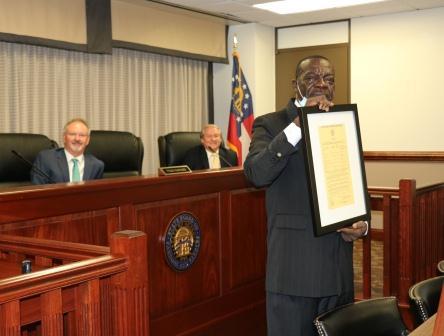
Success Stories
Today, Sheffield wins at life
Christopher Sheffield was a high school football star and a collegiate star. He made his way to the NFL, first playing for the Pittsburgh Steelers for two years and then a year with the Detroit Lions.
Drug use ended his football career in 1987.

But as Sheffield told the State Board of Pardons and Paroles, as he received a pardon from the state, his opportunity on parole led to the ability to help others defeat addictions.
“Because of the opportunity the Parole Board gave me, I then was able to re-educate myself and position myself to educate and re-educate others and that’s been the most gratifying thing that I’ve received,” Sheffield told the Parole Board in August of 2020.
At the Board’s monthly meeting, Sheffield spoke about his life, including the successful football career, and his addiction, prison, parole, and recovery.
Sheffield says the difference between him and many offenders, who are granted parole, was a decision that he made.
“I made a conscious decision to turn my will and my life over to God.”
Sheffield was paroled from prison in 1997. His 10-year sentence was commuted in 2003 and his political and civil rights were restored at that time.
Today, Sheffield is the manager of the Georgia Pines Community Service Board’s Addictions Recovery Support Center in Thomasville, Georgia, and he’s a certified addictions counselor. His most recent accomplishment was completing additional training to become a Certified Addiction Recovery Empowerment Specialist (CARES). He continues to help others beat addiction.
Sheffield says the system the Parole Board has does work.
“I’m here to tell you, the work that you do is relevant and the system (parole) that you have created is effective. From my life experience, it works.”
Following his presentation in August, Sheffield was presented with a pardon by Parole Board Chairman Terry Barnard.
“The process to apply for a pardon is no small thing. It is an act of official forgiveness by the state of Georgia and Chris’ presentation today is further indication that he is certainly deserving of being pardoned,” stated Barnard.
Sheffield had previously completed the pardon application but had not yet been notified of the Board’s decision.
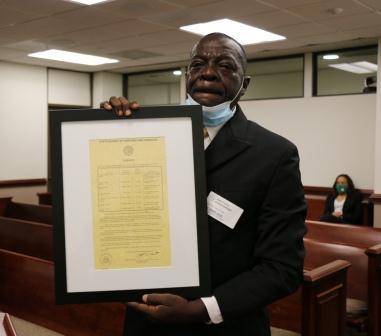
Sheffield became emotional and said that he wished his mother, who passed away in 1999, was present in order to witness that he had fulfilled the promises she had asked of him.
During his presentation, Sheffield told the Board that offenders leaving the system need to be prepared for the opportunities that come.
“I think God has allowed me to exist and possibly even created me from the beginning to be in this position so that I can assist those who do not know the way from point A to point B.
If the Parole Board had not given me the opportunity to change my life in 1997, then I would have spent the remainder of that ten-year sentence in that institution and God knows where I would be today,” he added.
The video of the August 2020 Parole Board meeting is available on the State Board of Pardons and Paroles' website at www.pap.georgia.gov.
Tina Stanley; Success on parole, now pardoned
The State Board of Pardons and Paroles surprised a former offender in October of 2019 with a pardon.
Tina Stanley was forgiven for her past felony convictions.
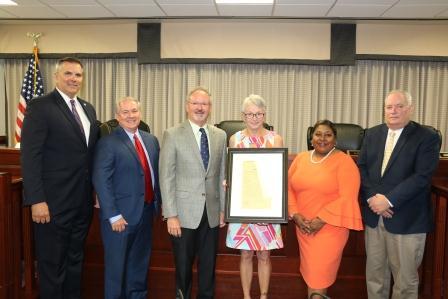
The pardon is an act of “official forgiveness” on the part of the state. At the Board’s monthly meeting, Stanley spoke to the five-member Parole Board after a video was shown detailing her many years of drug and alcohol abuse, followed by prison, parole, recovery, and ultimately the judge in her case commuting the remaining probation portion of her sentence.
Watch Tina Stanley; https://www.youtube.com/watch?v=QeoMdfKiF5o&t=6s
Stanley said this about receiving the pardon.
“My whole life starts over, the Lord told me this was going to happen and today was the day. I think it is wonderful and amazing and I’m very grateful,” she said.
Parole Board Chairman Terry Barnard presented Stanley with the pardon and thanked Stanley for sharing her “faith” and her life experiences with the Board.
Barnard said, “We know that more than 70% of those who are paroled in Georgia are successful, a percentage well above the national average, but it’s not often we get to hear firsthand the details of these positive outcomes, and then today, we see those who have been paroled and they’re successful. Not many are pardoned, however Tina Stanley is certainly deserving of this pardon.”
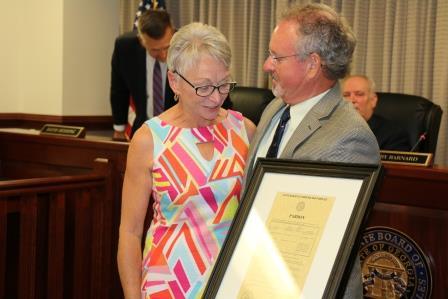
Today, in late 2020, Stanley is now more than fifteen (15) years in recovery. She continues to volunteer at “Innervention,” a program where she lives in Dalton, where she facilitates treatment groups and she speaks to other recovery groups about her experiences and the state’s pardon process.
“I just wanted to be a positive person and give back, and I’m still doing that,” Stanley says.
In September of 2020, Stanley began a new journey as she got married.
She says, “Life is good. We are still very active in our church and stand strong on our faith.”
A pardon may serve as a means for the petitioner to advance in employment or education. A pardon does not expunge (remove) an offense from the person’s record. The Parole Board may issue a pardon to a former offender who has met all the requirements including being crime free for a minimum of five years. Learn more at www.pap.georgia.gov.
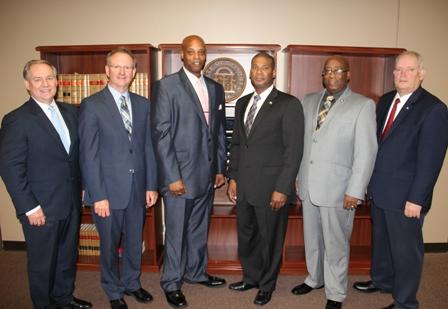
On Parole For Life, Walker Carries Responsibility to Succeed
Sean Walker appeared before the State Board of Pardons and Paroles at the November 2015 monthly board meeting to tell his story, to apologize and to thank the five member board for his 2014 parole, following 21 years in prison.
(Sean Walker with Georgia's Parole Board)
“I never had the chance to publicly apologize for the crime that I committed,” stated Walker. “I do apologize,” he added.
Walker was apologizing for the murder of his girlfriend, who was also the mother of Walker’s young daughter. He was convicted and sentenced to life with parole eligibility in 1994.
Walker, who had no previous run-ins with law enforcement, was facing a life in prison, but he says he wasn’t concerned for himself or his future. Walker says, at times, he felt because of what he had done and the pain he had caused, that he didn’t deserve parole.
"I had no right to do what I did, and I will forever live with that.”
Walker says he accepted his punishment and he told the Board that there comes a point when you have to stop blaming others and take responsibility for what you’ve done wrong. He says that was his turning point.
“I wasn’t going to be like most guys in prison and fight my case in the courts. I felt bad for what I did and felt that I deserved whatever punishment I received. I even thought that maybe I needed to be sitting in the electric chair. The impact of my life sentence didn’t hit me until years down the line when I thought I may never get out.”
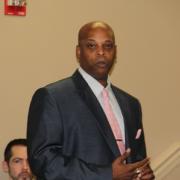
Walker found a bit of hope, in 2004. Then Georgia Department of Corrections Commissioner, James Donald, attended a graduation ceremony at Baldwin State Prison and heard Walker’s commencement speech. Impressed with Walker, Donald urged him to consider requesting assignment to the work detail at the Governor’s mansion.
Another year passed as Walker continued teaching and mentoring other inmates inside Georgia’s prison walls. As that time passed, he began to think of the possibilities.
“The opportunity to get away from the prison setting, adjust to society, and improve my communication skills by dealing with people other than inmates and prison staff,” appealed to me, he says.
In 2009, after having been denied parole again, Walker was finally accepted to the Governor’s mansion detail. Initially, he was assigned to yard duties; however, his work ethic and attitude rapidly earned him the responsibility of working as a cook preparing food for Governor Perdue and his family and it continued for Governor Deal.
It was what he least expected from his time serving at the Governor’s mansion that now serves as his motivation for working hard and being successful. Walker explains that he was surprised by Governor Deal, First Lady Sandra Deal, and all of their children and grandchildren.
“They are actually people in positions of power who really care about the lower end of society, the prisoners. It still blows my mind how the Deals treated us like family members. It’s what we all needed.”
In 2013, the Parole Board finally voted to parole Walker provided that he successfully complete a work release program. In February 2014, Walker was finally released on parole.
“I wish I could kiss every Board Member on the cheek,” says Walker. “They have a tremendous job. It’s a challenging decision. I am glad they saw that I was not going to be an idiot when I got out, and I pray that they continue to make the right decisions for others.”
Walker told the Board and those at the board meeting last November that he thanks God for putting people on the Board who are in a position to change lives, as well as giving those (inmates) who haven’t learned their lesson more time in order to understand. He says because of his parole he has major responsibilities. Walker is grateful for his freedom and believes he has a duty to the Governor and the Parole Board.
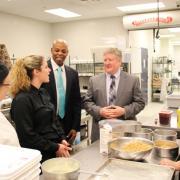
“I thank you guys for the opportunity to allow me to return back to society. I have a tremendous responsibility. I take that with me everywhere I go, every step and decision that I make, I know that I represent the Governor’s Office, I represent the Parole Board, and I represent my family,” stated Walker. “I got my current job because Governor Deal put his name behind mine. I got my freedom because the Parole Board felt that I was ready to return to the community and to be successful. I now represent them each and every day in everything that I do. That keeps me from making bad decisions.”
(Walker surrounded by staff at Augusta area Goodwill)
Earlier in 2015, Walker was recognized by Governor Deal during Deal’s inauguration speech.
Today, Sean Walker is the banquet-catering sales coordinator for the Augusta-area Goodwill, a job he acquired while he was in work release. He also serves on the Governor’s steering team that is tasked with finding ways to help individuals returning from prison. Ultimately, Walker wants to work in the prisons as an In-Reach Specialist.
“I want to be the person that makes a difference for others who are in prison. I want to give hope and inspiration and be a resource for inmates who need help finding a job, finding a place to live, and dealing with the uncertainty of being released. Who better to hold their hand than someone who’s been through it?”
The Parole Board Hears This Parole Success Story Firsthand
It is rare that an offender is able to address the Parole Board, outside a revocation hearing. It is even rarer that a paroled offender attends a monthly board meeting. That however happened at the May 2015 board meeting.
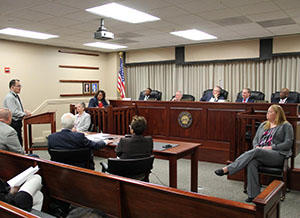
Parolee Randy Davis is a Braille specialist working at Georgia Tech. Davis took time off from work to speak to the Parole Board at the Board’s monthly meeting in Atlanta. It was the Department of Corrections’ Braille Transcribers program that gave Davis an opportunity at a second chance in the free world.
“I had the opportunity to get the position (Georgia Tech) because of prison. I devoted my time to reconstructing who I was,” stated Davis. He says the opportunity to learn Braille transcribing "revealed" itself in Prison. “So I jumped at the opportunity and my journey with Braille began.”
Davis says Georgia’s visually impaired children benefit from the prison Braille program. “The focus of the prison inmate training program is to produce Braille books for those children. It was an opportunity to help another; that was the main draw. The amazing thing is that I received more help than I gave. I’m here today because of that program and the opportunity it gave me. It has afforded me to advance myself and now I’m able to give back by training inmates at other prison Braille programs. That opportunity really helped rebuild my self-esteem.”
Davis is using his skills, learned in prison, on his job working for AMAC Accessibility Solutions and Research Center at Georgia Tech, where Braille textbooks are produced and shipped to customers.
Guy Toles, is Davis' supervisor at AMAC and says, "He's among the most qualified Braille transcribers in the country."
Davis says one of his goals is to further promote prison Braille programs as a means for rehabilitating inmates and assisting them as they re-enter society.
“That’s my greatest joy, to help both sides, the kids that need these materials and the men and women who are getting the opportunity to produce these materials,” in prison, Davis said.
Davis, asked to reflect on his past, says his convictions including the one for Robbery by Intimidation of which he's now on parole for, were the result of a drug habit but he adds it is the past. "I've come to terms with it, I don't run from it and I've moved on," he stated.
He thanked the Board for providing him the opportunity through a parole release.
“This opportunity means so much, not only to me, but to my new daughter, my family and mostly to the kids who we provide the text books for so they have the opportunity to further their education. It’s wonderful to be a part of that.”
Parole Board Chairman Terry Barnard invited Davis to speak at the meeting. Barnard says through opportunities provided to inmates in the prison system, many offenders are successful while under parole supervision.
“Mr. Davis is just one example of parole success in Georgia. Offenders who take advantage of the opportunities that exist in prison and once on parole, can be successful and at the same time provide for safer communities,” Barnard said.
Davis was recently invited to be a part of the prestigious Braille committee, BANA (Braille Authority of North America), which Davis calls a "dream come true." BANA works to promote and facilitate the uses, teaching, and production of Braille.
Parole Board Pardon gives ex-offender’s career a ‘second-wind’
Today, Tommy Lowmon, City of Blackshear’s Hometown Manager and Economic
Development Director, sits behind his desk in an office located just inside City Hall. Numerous awards and certificates highlighting his career achievements and successes decorate the wall to his right. But life hasn’t always been this promising for Lowmon.
Almost fifteen years ago Lowmon sat in a dramatically different place. In April 2000, Lowmon was seated at the defendant’s table in Superior Court of Pierce County facing a judge and a charge of Armed Robbery. The judge would eventually accept Lowmon’s guilty plea to the lesser included offense of Robbery by Sudden Snatch. Lowmon was subsequently sentenced to serve five years on probation under Georgia’s First Offender Act. When he reflects on the circumstances which led to his legal troubles, Lowmon accepts responsibility for his actions and inactions and says, “I was in the wrong place at the wrong time and I didn’t report it.” He added that this mistake was a definite setback to his life and his hopes of any real future success.
A few months prior to the end of his probation, the court adjudicated Lowmon guilty and terminated the remainder of his sentence. From that point forward, Lowmon turned over a new leaf and never looked back. He became an entrepreneur and, for several years, owned his own print company which he later sold to pursue other interests. Following the conclusion of his sentence, Lowmon continued to live a life free of criminal activity. After maintaining his current position for several years, Lowmon still desired to advance his professional career even further. He was well aware, however, that his past legal trouble could be a potential setback on the path to continued career success.
“I always knew it would probably come back up," said Lowmon. He added that he was very cognizant of his criminal record and the negative impact it could have had on his future career plans. With that probability in mind, Lowmon said, “I wanted to have something positive reflected on the record as well.” So, in the fall of 2013, Lowmon decided to step out on faith and make application for a pardon and restoration of firearms rights with the State Board of Pardons and Paroles. After reviewing and considering Lowmon’s application, the Board agreed to issue the pardon and to also restore his firearms privileges. When asked what kind of impact receiving a pardon has had on his professional life, Lowmon said, “Each [pardon] the Parole Board grants gives guys a second-wind so they can continue to pursue whatever goals they had in life.” And with that second-wind, Lowmon is running full-speed ahead. In 2013, he served as vice-president of Georgia’s Downtown Business Association and, in 2014, he was elected president. In 2014, he was also selected to serve with the Young Gamechangers. Young Gamechangers is a community improvement group which consists of young business men and women under the age of forty.
In spite of all the progress Lowmon has made over the past several years, he’s not blinded by the bright lights of his personal successes. He believes it’s important to give back through service to his community and he’s also sharing his story with other men who find they face similar legal challenges, through the faith-based program, Men of the Way Ministries.
“I tell them that this is possible. A lot of them don’t believe that it’s possible. I tell any guys looking to apply for a pardon, just keep the faith because it can happen," said Lowmon. He went on to say, “With this pardon, the sky’s the limit.”
In FY 2014, the State Board of Pardons and Paroles reviewed over 1,040 pardon applications. Of that number, approximately 980 were granted. A pardon is an order of official forgiveness and is granted to those individuals who have maintained a good reputation in their community following the completion of their sentence(s). It does not expunge, remove or erase the crime from an individual’s record. It may serve as a means for a petitioner to advance in employment or education.
For more information on pardons, restoration of rights or the State Board of Pardons and Paroles please visit our website at pap.georgia.gov.
Parolee continues to give....
Jackie Cooper along with her other five siblings was raised only by their mother. They grew up not having much. Sometimes that included not having electricity.

(At right are Douglasville Asst. Chief Parole Officer Rita Rothwein, Douglasville Police Dept. Chief Deputy Gary Sparks and Jackie Cooper)
Jackie says at age 18 she went into a department store where she was asked to apply for a credit card, so she did, using someone else’s name. She was approved for $500.00 and maxed-out the card. She started going to other stores applying for cards using other people’s names. She went from wanting nice clothes and shoes to getting a high by being able to get away with it, she says.
In 1989, Jackie was caught and sentenced to 24 of months probation under the first offender’s act. However, she continued committing fraud and theft until 2006 when she was sentenced to 15 years, serving 6 years in prison before her parole release.
On May 27, 2011, Jackie reported to parole for her initial interview coming in with a positive attitude says her parole officer Rita Rothwein. She also admitted guilt. However, she had a determination that she would make something of her life while having an influence on others. Her goal was to keep others from going down the road that she had traveled, says Rothwein.
Community program provides opportunity to help others
During Jackie’s transition from prison to the community, she and her sister, Brandi, began working with a mentoring program called Passionate About Living Souls (PALS). PALS is a community program that helps newly released and incarcerated women and their children get connected with different organizations to help meet their needs. Jackie and her sister continued working with the program assisting many women with their needs. The program holds a special place in Jackie’s heart because she loves being an advocate for women and youth. Her work and commitment to the program is credited for its growth.
In September 2011, Rothwein, the assistant chief in Douglasville, put Jackie in contact with Chief Deputy Gary Sparks, of the Douglasville Police Department, regarding the Youth Against Violence program. Now, each week, Jackie teaches ‘Criminal Addictive Thinking’ on Thursday’s and every Saturday she teaches ‘Confronting Peer Pressure.’ She is the first woman out of prison to ever teach classes at the Youth Against Violence program.
Chief Deputy Sparks was asked about Jackie and had this to say; “When I first sat down to talk with Jackie about helping I could tell that she wanted to give back and do something for her community and to help the youth,” said Sparks.
He says Jackie tries to get the youth to look deep within while letting them know that they can succeed no matter what their past may include. Chief Deputy Sparks says Jackie arrives every Saturday with a smiling face and a willingness to share and serve. He states she is committed to the program and that shows integrity. He adds that anything they ask Jackie to talk about she does, no matter what topic it is, and she does a great job. Deputy Chief Sparks stated that Jackie is a very positive person even though she has had a negative background and she is an “OVERCOMER.”
Audre Toles Coleman, Youth Against Violence Program Administrator, calls Jackie, “AWSOME.” Coleman says Jackie is a prime example of a great volunteer.
Jackie also has begun working with the Atlanta Police Department’s (APD) Atlanta Youth Initiative. Youth Coordinator, APD Officer Keith Roach says Jackie is, “excellent with the kids and she’s a great female mentor.”
Jackie has four children and when she talks about them she has the biggest smile on her face. Jackie missed five years of their lives but during her prison time she stayed in communication with them. Two of her children are currently in college, one is in the Navy and her youngest is planning on going into the Marines. Jackie says she’s always pushed them to do better and not follow in her footsteps.
When Jackie was asked what quote she would like to go in this article she stated, “My 3 Ps.” She said, “God has preserved and prepared me for a purpose and hopefully my three Ps will have a profound effect on someone.” Rothwein says God is using Jackie to make a difference in lives and she is certainly giving back to the community.
“JACKIE COOPER IS A SUCCESS STORY” and Jackie says she knows this is only by the grace of God. Jackie Cooper’s parole ends on February 10, 2016, and Rothwein says she feels very blessed to see what Jackie has become and looks forward to seeing what else God will do through Jackie.
Alexander’s support has helped him (Sentenced to life, a parole success story)
He’s responsible, dependable, and loyal,” says Pastor Edward Grant. Grant is talking about parolee Willie Alexander, who stays and works at Good News at Noon, a community center and shelter operating in Gainesville. Grant is the executive director of the center.
It is not the manner in which you could always describe Alexander. Not when he was serving prison time for murder, armed robbery or for violating his parole. Not the way you describe him when he was paroled in February 2008 and arrived at Good News at Noon and certainly not the way you would describe him when he ran by the name of 'Miami' in South Carolina, or another alias, 'Taboo' which he picked up in prison.
Alexander’s parole officer, Dale Williams says when he came out on parole, he couldn’t identify with the outside world and the changes that had occurred while he was incarcerated. He had difficulty, but his story is enlightening, she says.
Up until February 2008, Alexander had spent most of his life in prison since his first conviction in 1971 for armed robbery. He got life for the murder he committed in 1980 in Georgia. Yes, he was given chances. Paroled in 1989, more criminal activity, and back in by 1992. Out again, but right back in. Parole revoked, and back serving the life sentence.
Perhaps it is simply maturity, but he will tell you, it is more than that. He says, “I work for the Lord, I serve the Lord.”
Alexander says, “I changed my life. My life consists of serving God. It took me 58 years to get here.”
Good News at Noon distributes food, clothing and many other necessities to the needy in Gainesville and the surrounding community. Its founder is “Mr. B” as he’s affectionately called. Gene Beckstein has helped Alexander since his arrival at Good News. He has provided the opportunities for Alexander who has taken advantage and is now working at the center as a program manager. Among his responsibilities is managing offenders who come to Good News to complete community service. Their responsibilities include getting together the donations to the shelter and they clean up, mop and do garbage detail.
Alexander utilizes his past experiences and mentors those he manages, those he comes into contact with that are younger, as most everyone is, and who have come in contact with the criminal justice system, as he did at their age.
Alexander freely gives his testimony and tells about himself as he speaks to youth in church group settings, in schools and elsewhere. He has attempted to reach gang members telling them their lives, if pursued, will have repercussions.
He says what he does, makes him stronger and is granted through prayer.
He says it makes him feel good and it’s worthwhile and gives him a measure of redemption.
He says, “What I’ve done (his past) is not in vain.”
He says he knows he’s done wrong; now he’s doing right. How does a 60 plus year old aging criminal relate to today’s youth? Alexander answers, “They love to relate to me. They don’t see age, they see the truth and I’m straight up with them.”
He admits to them doing drugs; “weed and cocaine,” he tells me. He admits participating in gangs. He sees the respect the youth have for him and says these youth know they can talk in confidence with him.
Alexander freely admits, when he came to Good News in February 2008, he came without the Lord. He gives “Mr. B” the credit and says he was instrumental in getting him on the right track.
“He showed me love,” says Alexander. Alexander credits Mr. B with his success and says Mr. B reintroduced him to love and reminded him to let God show you love and you show others. Alexander says he tells Mr. B, “You can depend on me.”
Supervision:
Officer Dale Williams says Alexander is among her top parolees. She says he would say that, “Freedom is precious, he’s made mistakes and he helps others.”
Williams says Alexander meets all conditions and he shares his insights with parolees, students, clubs and church groups. She says he’s earned the respect of those at Good News and the community supporters who volunteer and give there.
She emphasizes there have been no problems with his supervision. “He’s made a change,” she says. She adds, “Others say they’ve changed, but they don’t live it.” She says she hasn’t seen any example that he’s not doing what he says. She says Alexander seems, “earnest and humble.”
She views his change (since his parole) as part maturity and change. “He is older and wiser, but also he gives all credit to God,” says Williams.
As a parole officer, “It’s hard to be a trusting soul, I want to believe him,” she adds.
Williams closes her part by saying that, “Alexander is an inspiration. I hope I’m not fooled,” and she finishes, that Alexander says, “freedom is precious.”
Alexander’s future plans:
He has none, but admits he would, as a goal, like to get off of the lifetime parole supervision. He says that would be an accomplishment. He says his only plans are to continue what he’s doing; serve the Lord and doing the right thing. Alexander says he’s not leaving; he has nothing to run to, no family.
He says he spends too much time helping people for him to get into trouble. He reiterates, “I know right from wrong.”
He thinks back to his early age, and his convictions; “I was hotheaded, I was into a negative life.” He says he thinks about the life he took, the situation and what he could have done differently. “I think of what I could have done, not killing him, not shooting him.”
He admits maturity has a great deal to do with it, “absolutely. Experience in life gives you the knowledge.”